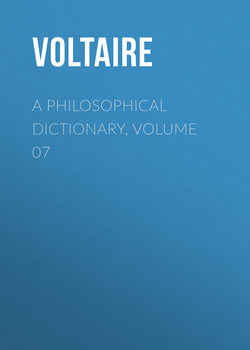Читать книгу A Philosophical Dictionary, Volume 07 - Voltaire, Вольтер - Страница 6
KING
ОглавлениеKing, basileus, tyrannos, rex, dux, imperator, melch, baal, bel, pharaoh, eli, shadai, adonai, shak, sophi, padisha, bogdan, chazan, kan, krall, kong, könig, etc.– all expressions which signify the same office, but which convey very different ideas.
In Greece, neither "basileus" nor "tyrannos" ever conveyed the idea of absolute power. He who was able obtained this power, but it was always obtained against the inclination of the people.
It is clear, that among the Romans kings were not despotic. The last Tarquin deserved to be expelled, and was so. We have no proof that the petty chiefs of Italy were ever able, at their pleasure, to present a bowstring to the first man of the state, as is now done to a vile Turk in his seraglio, and like barbarous slaves, still more imbecile, suffer him to use it without complaint.
There was no king on this side the Alps, and in the North, at the time we became acquainted with this large quarter of the world. The Cimbri, who marched towards Italy, and who were exterminated by Marius, were like famished wolves, who issued from those forests with their females and whelps. As to a crowned head among these animals, or orders on the part of a secretary of state, of a grand butler, of a chancellor – any notion of arbitrary taxes, commissaries, fiscal edicts, etc. – they knew no more of any of these than of the vespers and the opera.
It is certain that gold and silver, coined and uncoined, form an admirable means of placing him who has them not, in the power of him who has found out the secret of accumulation. It is for the latter alone to possess great officers, guards, cooks, girls, women, jailers, almoners, pages, and soldiers.
It would be very difficult to insure obedience with nothing to bestow but sheep and sheep-skins. It is also very likely, after all the revolutions of our globe, that it was the art of working metals which originally made kings, as it is the art of casting cannon which now maintains them.
Cæsar was right when he said, that with gold we may procure men, and with men acquire gold.
This secret had been known for ages in Asia and Egypt, where the princes and the priests shared the benefit between them.
The prince said to the priest: Take this gold, and in return uphold my power, and prophesy in my favor; I will be anointed, and thou shalt anoint me; constitute oracles, manufacture miracles; thou shalt be well paid for thy labor, provided that I am always master. The priest, thus obtaining land and wealth, prophesies for himself, makes the oracles speak for himself, chases the sovereign from the throne, and very often takes his place. Such is the history of the shotim of Egypt, the magi of Persia, the soothsayers of Babylon, the chazin of Syria (if I mistake the name it amounts to little) – all which holy persons sought to rule. Wars between the throne and the altar have in fact existed in all countries, even among the miserable Jews.
We, inhabitants of the temperate zone of Europe, have known this well for a dozen centuries. Our minds not being so temperate as our climate, we well know what it has cost us. Gold and silver form so entirely the primum mobile of the holy connection between sovereignty and religion, that many of our kings still send it to Rome, where it is seized and shared by priests as soon as it arrives.
When, in this eternal conflict for dominion, leaders have become powerful, each has exhibited his pre-eminence in a mode of his own. It was a crime to spit in the presence of the king of the Medes. The earth must be stricken nine times by the forehead in the presence of the emperor of China. A king of England imagines that he cannot take a glass of beer unless it be presented on the knees. Another king will have his right foot saluted, and all will take the money of their people. In some countries the krall, or chazin, is allowed an income, as in Poland, Sweden, and Great Britain. In others, a piece of paper is sufficient for his treasury to obtain all that it requires.
Since we write upon the rights of the people, on taxation, on customs, etc., let us endeavor, by profound reasoning, to establish the novel maxim, that a shepherd ought to shear his sheep, and not to flay them.
As to the due limits of the prerogatives of kings, and of the liberty of the people, I recommend you to examine that question at your ease in some hotel in the town of Amsterdam.
